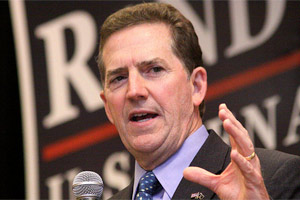That GOP earmark war Mother Jones has been reporting on? It’s heating up.
On Wednesday, Oklahoma Senator James Inhofe came out in staunch opposition to South Carolina Senator Jim DeMint’s proposed two-year ban on earmarks. So far, DeMint has managed to bring at least a dozen fellow Republicans on board, including tea party-backed freshmen like Utah’s Mike Lee and Florida’s Marco Rubio. The (non-binding) ban is scheduled to come to a (secret) vote on Tuesday, and would apply only to Republicans.
But events of this week have done little to quell the speculation that the GOP is in serious crisis over the issue, with Minority Leader Mitch McConnell mounting a quiet effort to counter DeMint. His reasoning: that banning earmarks doesn’t do enough to curb government spending. And if Congress gives up its right to earmark, it places the power of the purse squarely in the hands of the president (and, of course, Democrats, who aren’t subject to the moratorium).
In solidarity with DeMint, the Tea Party Patriots sent out a letter to their followers, backing DeMint’s moratorium. Inhofe, though, is determined to show them the light. Late yesterday, Politico‘s Manu Raju reported that the Oklahoma senator spoke on the phone with one of the group’s national leaders, Mark Meckler, to convince him that earmarks can be a force of fiscal good. From Politico:
It was a brief conversation, in which Inhofe said he wanted to provide Meckler’s group with an essay titled “The Secret About Earmarks.” It argues that eliminating them “won’t save taxpayers a single dime.” … Meckler said in an interview that the phone call was “bizarre,” adding that “we normally don’t have a lot of direct contact with senators.”
Inhofe claims he can change the minds of those who have been “brainwashed,” likening the misinformation on the evil of earmarks to that whole global warming hoax.
Inhofe spokesman Matt Dempsey says the senator has been a big supporter of the tea party. He characterized the senator’s outreach drive as a series of simple exchanges with old friends in conservative circles, like FreedomWorks leader and former House majority leader Dick Armey. “He’s working closely with friends,” Dempsey said of Inhofe. “This is really zeroed in on folks that he’s worked with for a number of years.”
Dempsey suggests that the perceived gulf between Inhofe and DeMint isn’t as wide as the media has portrayed it. “They may not be as far apart as the media might be characterizing it,” he says. “We feel like [DeMint’s] resolution may go too far, and cede too much authority to the Obama administration. So we probably are a lot closer than lot of these articles are suggesting.”
Guest-blogging at the Washington Post‘s Plum Line, The American Prospect‘s Adam Serwer writes that:
Conservatives target earmarks because, in isolation, they’re often hard to defend, and they’re an easy symbol of Washington greed to rail against. The problem is that while they are frequent fodder for political rhetoric, they account for less than 1 percent of the federal budget. Republicans remain steadfastly committed to preserving the Bush tax cuts for the rich and they’ve been laughably demure on what federal programs they would actually cut. But they’ve managed to get into a heated argument among themselves over whether or not to cut a miniscule part of the federal budget.
Regardless of the outcome of Tuesday’s vote, the brewing storm’s climax presents an early, perhaps unwanted showdown between the party’s ruling class and its incoming band of tea party insurgents.






